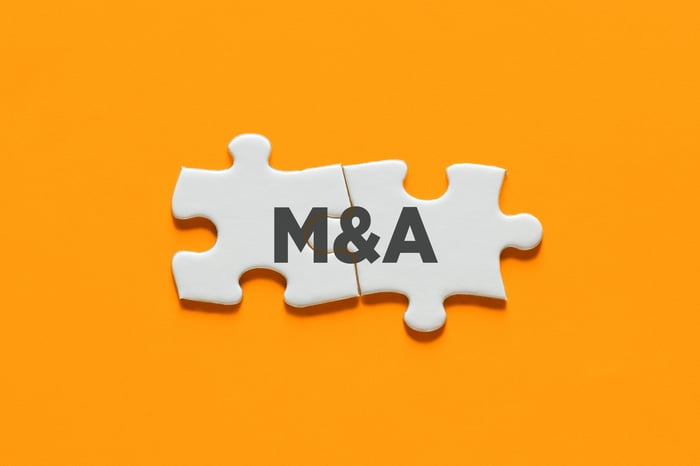Wall Street has a habit of swinging between being overly positive and overly negative. One area where those positive feelings often reign supreme is in the arena of mergers and acquisitions. But not all big deals that are proposed succeed, and there are material implications for the players when they fall through. This is important to remember as you look at ExxonMobil's (XOM -0.01%) proposed acquisition of Pioneer Natural Resources (PXD).
ExxonMobil's big deal for Pioneer
ExxonMobil announced its plan to buy Pioneer on Oct. 11. It offered an all-stock deal, which means that shareholders of Pioneer will get shares of ExxonMobil in exchange for the shares of Pioneer they own. The exchange rate is pegged at 2.3234 shares of ExxonMobil for each share of Pioneer. At the time of the announcement, that translated to a value of roughly $253 per share of Pioneer. Including debt, the deal was valued at $64.5 billion.

Image source: Getty Images.
That's not a small transaction, and assuming the deal is consummated as planned, energy giant ExxonMobil will materially increase its scale in the U.S. onshore space. This, no doubt, is why the Federal Trade Commission is taking its time evaluating this acquisition for approval. The regulator has asked for additional information via a second information request. That doesn't mean the deal won't get approved, but it is exactly what you would expect to happen if there was a growing likelihood of it getting blocked.
There are a lot of moving parts here for investors. For example, the value of the deal is entirely dependent on ExxonMobil's stock price. So that $253 per share value placed on Pioneer was only accurate at the moment it was issued. As ExxonMobil's stock waxes and wanes, so too will the actual value of the all-stock deal. Then there's the fact that there's almost always a discount between the offered price for the target and the actual price at which the target trades on an exchange. That exists because of the concern that the deal may fall through. The discount usually widens as deal concerns rise.
What happens when a deal falls apart
Sometimes, acquisition bids get really ugly and end up in court. That happened when Energy Transfer (ET 0.10%) agreed to buy Williams Companies (WMB -0.04%) around a decade ago, but then got cold feet. The twists and turns of that story were headline news, including what appeared to be a move by insiders at Energy Transfer to protect themselves at the expense of shareholders. It was a very public mess. This isn't the norm, and probably not what investors should expect here. However, there is an important takeaway given ExxonMobil's size. News flow about the deal could lead to swift price swings in the shares of both ExxonMobil and Pioneer.
That includes the chance that ExxonMobil and Pioneer may fight if the deal isn't approved. The courts are exactly where the attempted merger between Jetblue (JBLU -0.26%) and Spirit Airlines (SAVEQ -6.10%) ended up after it was held up by regulators who were concerned that it would reduce competition in the airline space. That doesn't reduce the uncertainty in any way, but certainly makes things more dramatic and, perhaps, binary. (Win in court and the deal goes through; lose and it collapses.)
The real problem for investors is that a scuttled deal often results in a swift share price decline for the acquisition target. That's exactly what happened to First Horizon (FHN -1.61%) when Toronto-Dominion Bank (TD 0.19%) was forced to call off its acquisition of that bank following regulatory pushback. Essentially, when a buyout offer gets taken off the table, whatever portion of the premium that had been offered by the buyer that was priced into the target's shares instantly goes away. In the case of ExxonMobil's proposed deal with Pioneer, the price on offer was 18% higher than the price before news of a potential deal leaked out.
This could get exciting and end badly
There's no way to know precisely what regulators are thinking with regard to the ExxonMobil/Pioneer transaction. However, a second request is not a great sign. News flow will likely be a big issue, and a disagreement between regulators and the parties could even end up in court if ExxonMobil wants to push that hard. And, in the end, it could still end up unable to close the deal, which would eliminate any premium priced into Pioneer's stock price. It's also possible that ExxonMobil's share price could get hit, too, since a big piece of its growth plan will have been stymied.
To be fair, oil stocks are highly volatile even in the best of times, so it may be hard to see the impact of all of the current uncertainty. But if you are an investor in either of these stocks, be prepared for an increasing level of uncertainty as the government mulls over the deal. And know that there is downside risk in the stocks if things don't go according to plan -- and for Pioneer in particular, that risk amounts to perhaps 18% (or more). But, in many ways, that's just par for the course when it comes to mergers.






